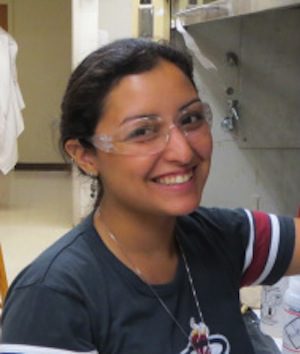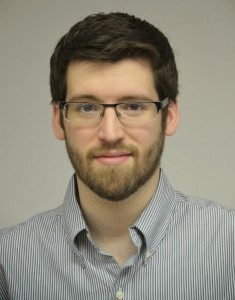College Home to Two of UNC Charlotte’s Three NSF Graduate Research Fellows

Physics major Jennifer Kassel and computer science and mathematics major Jonathan Knighten have received two of the three National Science Foundation Graduate Research Fellowships awarded to UNC Charlotte students for 2015.
The third recipient at UNC Charlotte is Kathryn Smith, who completed her bachelor’s degree in electrical engineering at UNC Charlotte in 2013 and is currently enrolled in the electrical engineering doctoral program.
These highly prestigious awards recognize and support outstanding graduate students who are pursuing research-based master’s and doctoral programs. The research fellows receive a $32,000 annual stipend for three years within a five-year fellowship period. They also receive a $12,000 cost-of-education allowance and professional development opportunities.
During their time at UNC Charlotte, Kassel and Knighten have found opportunities to conduct hands-on research while also helping others through volunteerism focused on science and technology.
Kassel Looks Ahead With Plans for Research
After completing her bachelor’s degree in May, Kassel plans to pursue a doctoratal degree, with future plans for teaching and leading her own research lab. Her field of study is Physics and Astronomy – Atomic, Molecular and Optical Physics; she has received offers from several universities. Michael Walter with the Department of Chemistry in the College of Liberal Arts & Sciences and the interdisciplinary Nanoscale Science Ph.D. Program is her advisor.
“I would like to stay in academia, contributing not only to scientific advancement, but the interest and understanding of our future scholars as well,” Kassel said. “I find well-known scientists like Carl Sagan, Neil Degrasse Tyson, and even Bill Nye inspiring in the way they share their fascination with the search for understanding. I see their candor as an attempt to spread that passion in hopes to spark a lifelong quest beyond the brink of human knowledge. If I can have that effect on just one person in my lifetime, I will consider my work a success. But I’ll never stop aiming for more.”
After high school, Kassel immediately entered the workforce for a few years. She then completed her associate’s degree in science at Central Piedmont Community College and later enrolled at UNC Charlotte. She quickly became involved with Tau Sigma and Omicron Delta Kappa honor societies and with the Society of Physics Students. She was chosen by fellow students to become the society’s president.
The students have volunteered with UNC Charlotte’s Science and Technology Expo, showcasing physics and astronomy. “We also help run the Star Party, educating registered guests to our campus on the telescope targets for the night while they get to view some of the cosmos a little closer,” she said.
Kassel learned about the graduate research fellowships opportunity as a participant in the Charlotte Research Scholars program. She furthered her knowledge about fellowships and research as one of 10 participants in the NanoSURE REU program.
Kassel is part of a interdisciplinary team of students, led by Walter and architecture faculty member Mona Azarbayjani, that has created a solar-responsive design material that transforms windows into environmentally-responsive surfaces that can simultaneously provide shade and convert sunlight into usable electric energy. The team won honorable mention in the People, Prosperity, and Planet Student Design Competition for Sustainability held by the U.S. Environmental Protection Agency in Alexandria, Virginia in April.
Knighten Plans to Pursue Ph.D. at Cornell University
 After graduation in May with bachelor’s degrees in computer science (College of Computing and Informatics) and mathematics (College of Liberal Arts & Sciences), Knighten plans to seek his doctoral degree in computer science at UNC Charlotte. He will draw upon his hands-on research experiences at UNC Charlotte. Jamie Payton, faculty in the Department of Computer Science in the College of Computing and Informatics, is his research advisor.
After graduation in May with bachelor’s degrees in computer science (College of Computing and Informatics) and mathematics (College of Liberal Arts & Sciences), Knighten plans to seek his doctoral degree in computer science at UNC Charlotte. He will draw upon his hands-on research experiences at UNC Charlotte. Jamie Payton, faculty in the Department of Computer Science in the College of Computing and Informatics, is his research advisor.
“Hands down the program that has had the biggest impact in my life is the Charlotte Research Scholars initiative,” Knighten said. “The CRS program opened my eyes to what research is and what it can be. It quickly became a passion. If it wasn’t for programs like CRS, I honestly do not know what I would be doing with my life right now.” Knighten learned about the fellowships while participating in the Charlotte Research Scholars program.
“Another major program that’s helped me find my way as a researcher is the NSF Research Experience for Undergraduate program,” he said. “Last summer I participated in the Data Intensive Computing REU held at Clemson University. Although I had already found my passion for research, the REU helped me mature and grow even more as a researcher. My experiences at Clemson showed me how important interdisciplinary research was and how amazing things can come out of having people with different academic backgrounds work together to tackle a problem.”
In addition to his academics and his research efforts, Knighten participates in the STARS Alliance and volunteers with Citizen Schools. He helps run an outreach program through STARS called MAD Investigators. “In MAD Investigators we teach middle school kids at MLK Middle School the fundamentals of Mobile Application Development, or MAD,” Knighten said. “During the outreach, students develop an Android app that tackles some type of issue in their community.”
For the last three years he has worked at Tutorial Services, which is a division of the University Center of Academic Excellence at UNC Charlotte. He was a senior peer tutor, meaning he was responsible for tutoring students and training other tutors. Through this work, he found a passion for teaching and mentoring others.
Three Former Chemistry Students Receive Honorable Mention Honors
In addition to the three students chosen to receive the fellowships, three chemistry students received honorable mention recognition.
- Patrick Quinlivan completed his bachelor’s degree in chemistry in 2013 and is attending Columbia University. Another participant in the CRS, his undergraduate advisor was chemistry professor Dan Rabinovich.
- David Townsend Smith received his bachelor’s degree in chemistry in 2012 and is attending the University of Arizona. While at UNC Charlotte, he worked with chemistry professor Craig Ogle.
- Marissa Styron received her bachelor’s degree in chemistry in 2013 from UNC Charlotte and is currently a Nanoscale Science doctoral student at UNC Charlotte. She is a recipient of the UNC Charlotte Graduate School’s 2013/2014 Everett Foundation First-Year Doctoral Fellowship. Rabinovich also was her advisor.
Over a period of 60 years, the NSF has awarded 48,000 fellowships in a wide range of disciplines including engineering, life sciences, economics, social sciences, psychology, mathematical sciences, physics and astronomy, chemistry, geosciences, computer and information science and engineering, STEM education and learning research and materials research. To date, 40 NSF fellows have gone on to become Nobel laureates. The NSF this year awarded just 2,000 fellowships among a national pool of 16,500 applications. UNC Charlotte ranks #4 in North Carolina for numbers of students awarded NSF Graduate Research Fellowships over the past six years.
Words: Brittany Algiere and Michael Eccles, CLAS Student Communications Assistants
Images: Courtesy of Kassel and Knighten